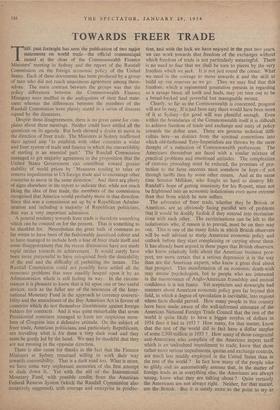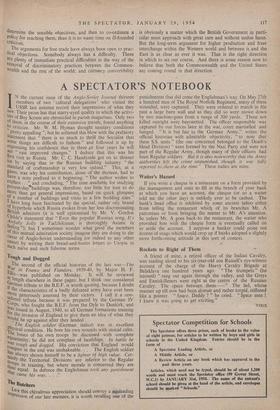TOWARDS FREER TRADE
THE past fortnight has seen the publication of two major statements on world trade--the official communique., issued at the close of the Commonwealth Finance Ministers' meeting in Sydney and the report of the Randall Commission on the foreign economic policy of the United States. Each of these documents has been produced by a group of men who did not reach unanimous agreement among them- selves. The main contrast between the groups was that the policy differences between the Commonwealth Finance MinWers were milled in the ambiguities of their final state- ment whereas the differences between the members of the Randall Commission were plainly stated in a series of dissents signed by the dissenters.
Despite these disagreements, there is no great cause for com- plaint about these meetings. Neither could have settled all the questions on its agenda. But both showed a desire to move in the direction of freer trade. The Ministers at Sydney reaffirmed their agreed aim ' to establish with other countries a wider and freer system of trade and finance in which the convertibility of sterling is an essential part.' The Randall Commission managed to get majority agreement to the proposition that the United States Government can contribute toward greater stability of world prices by ' Measures tending to relax or remove impediments to US foreign trade and to encourage other countries to move in the same direction.' And there are plenty of signs elsewhere in the report to indicate that, while not much liking the idea of free trade, the members of the commission recognised that America would probably move in that direction. Since this was a commission set up by a Republican Admini- stration and including a majority of Republican politicians, that was a very important admission.
A general tendency towards freer trade is therefore something which can be counted on for the present. That is something to be thankful for. Nevertheless the great bulk of comment so far seems to have been of the fashionably jaundiced colour and to have managed to include both a fear of freer trade itself and some disappointment that the recent discussions have not made rapid strides towards its achievement. It would surely have been more purposeful to have recognised both the desirability of the end and the difficulty of perfecting the means. The Randall Commission could not possibly have settled all the economic problems that were steadily heaped upon it by an Administration which is still feeling its way. In the circum- stances it is pleasant to know that it hit upon one or two useful devices, such as the fuller use of the resources of the Inter- national Monetary Fund in the approach to currency converti- bility and the amendment of the Buy American Act in favour of countries which do not themselves discriminate against foreign bidders for contracts. And it was quite remarkable that seven Presidential nominees managed to force ten suspicious mem- bers of Congress into a defensive attitude. On the subject of freer trade, American politicians, and particularly Republicans, are travelling what is for them a very dark road and they must be gently led by the hand. We may be thankful that they are not running in the opposite direction. tion, and with the luck we have enjoyed in the past two years, we can work towards that freedom of the exchanges without which freedom of trade is not particularly meaningful. There is no need to fear that we shall be torn to pieces by the very freedom which we, seek. It is not just round the corner. What we need is the courage to move towards it and the skill to build up our reserves as we go. Then we may find that this freedom, which a regimented generation persists in regarding as a savage beast, all teeth and heels, may yet turn out to be a broad-backed and powerful but manageable mount.
Clearly, so far as the Commonwealth is concerned, progress will not be easy. If it had been easy there would have been more of it at Sydney—for good will was plentiful enough. Even within the boundaries of the Commonwealth itself it is difficult to achieve freedom of trade and exchange and unity of policy towards the dollar area. There are genuine technical diffi- culties here---as distinct from the spiritual contortions into which old-fashioned Tory-Imperialists are thrown by the mere thought of a reduction of Commonwealth preferences. The Americans themselves are faced with a similar mixture of practical problems and emotional attitudes. The complexities of customs procedu must be reduced, the promises of pro- tection to the farm interests must somehow be kept---if not through tariffs then by some other means. And at the same time Senator Millikan, who fought so hard to destroy Mr. Randall's hope of getting unanimity for his Report, must not be frightened into an economic isolationism even more extreme than that from which he now suffers.
The advocates of freer trade, whether they be British or American. are so obviously facing parallel sets of problems that it would be doubly foolish if they entered into recrimina- tions with each other. The recriminations can be left to the isolationists who, if reason is to prevail, must be on their way out. This is one of the many fields in which British observers will be well advised to study American economic policy and outlook before they start complaining or carping about them. It has already been argued in these pages that British observers, who know relatively little about the American business pros- pect, are more certain that a serious depression is in the way than are the American experts, who know a great deal about that prospect. This manifestation of an economic death-wish may amuse psychologists, but to people who are interested in the maintenance of Anglo-American friendship and mutual confidence it is not funny. Yet scepticism and downright bad manners about American economic policy goes far beyond this field, in which a degree of speculation is inevitable, into regions where facts should prevail. How many people in this country have been made aware of the well-informed estimates of the American National Foreign Trade Council that the rest of the world is quite likely to have a bigger surplus of dollars in 1954 than it had in 1953 ? How many, for that matter, know that the rest of the 'world did in fact have a dollar surplus of some 2,500 million in 1953 ? How many of those congenital anti-Americans who complain of the American import tariff which is an undoubted impediment to trade, know that those rather more serious impediments, quotas. and exchange controls, are much less readily employed in the. United States than in the rest of the world ? In fact how many of the people who so glibly, and so automatically assume that, in the matter of foreign trade as in everything else, the Americans are always wrong, know what they are talking about ? Quite certainly the Americans are not always right. Neither, for that matter, are the British. But it is surely more to the point to try to determine the sensible objectives, and then to co-ordinate a Policy for reaching them, than it is to waste time on ill-founded criticism.
The arguments for free trade have always been open to prac- tical objections. Somebody always has a difficulty. There are plenty of immediate practical difficulties in the way of the removal of discriminatory practices between the Common- wealth and the rest of the world; and currency convertibility is obyiously a matter which the British Government in parti- - cular must approach with great care and without undue haste. But the long-term argument for higher production and freer interchange within the Western world and between it and the East is as clear as ever it was. That is the right direction in which to set our course. And there is some reason now to believe that both the Commonwealth and the United States are coming round in that direction.



















































 Previous page
Previous page